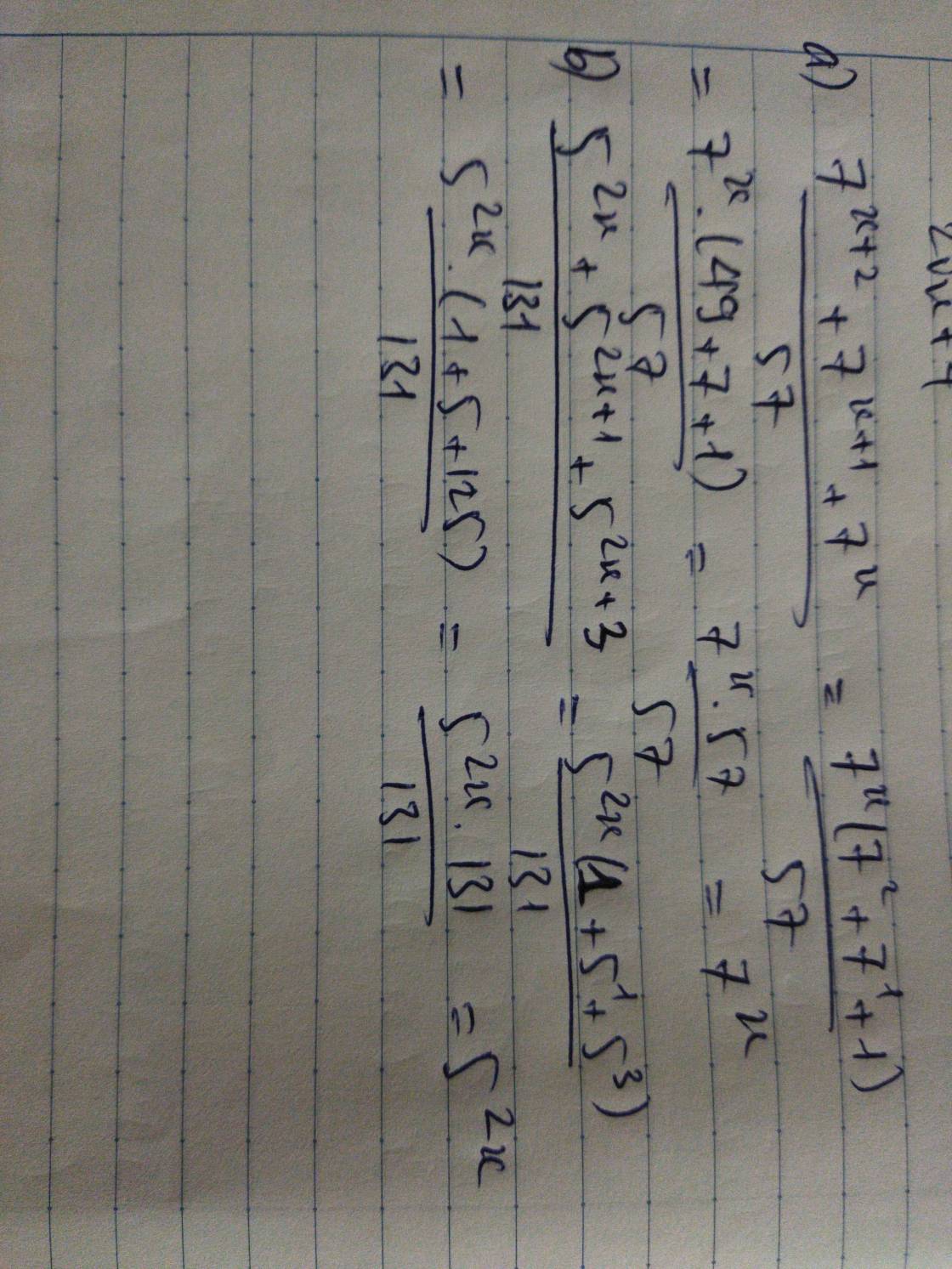
Hãy nhập câu hỏi của bạn vào đây, nếu là tài khoản VIP, bạn sẽ được ưu tiên trả lời.


a) \(A\left(x\right)=x^7-2x^6+2x^3-2x^4-x^7+x^5+2x^6-x+5+2x^4-x^5\)
\(A\left(x\right)=(x^7-x^7)+(-2x^6+2x^6)+2x^3+(-2x^4+2x^4)+(x^5-x^5)-x+5\)
\(A\left(x\right)=2x^3-x+5\)
- Bậc của đa thức A(x) là 3
- Hệ số tự do: 5
- Hệ số cao nhất: 2
b) \(B\left(x\right)=-3x^5+4x^4-2x+\dfrac{1}{2}-2x^4+3x-x^5-2x^4+\dfrac{5}{2}+x\)
\(B\left(x\right)=(-3x^5-x^5)+(4x^4-2x^4-2x^4)+(-2x+x+3x)+\left(\dfrac{1}{2}+\dfrac{5}{2}\right)\)
\(B\left(x\right)=-4x^5+2x+3\)
- Bậc của đa thức B(x) là 5
- Hệ số tự do: 3
- Hệ số cao nhất: \(-4\)
c) \(C\left(y\right)=5y^2-2.\left(y+1\right)+3y.\left(y^2-2\right)+5\)
\(C\left(y\right)=5y^2-2y-2+3y\left(y^2-2\right)+5\)
\(C\left(y\right)=5y^2-2y-2+3y^3-6y+5\)
\(C\left(y\right)=5y^2-2y+3+3y^3-6y\)
\(C\left(y\right)=5y^2-8y+3+3y^3\)
\(C\left(y\right)=3y^3+5y^2-8y+3\)
- Bậc của đa thức C(y) là 3
- Hệ số tự do: 3
- Hệ số cao nhất: 3

* Trả lời:
\(\left(1\right)\) \(-3\left(1-2x\right)-4\left(1+3x\right)=-5x+5\)
\(\Leftrightarrow-3+6x-4-12x=-5x+5\)
\(\Leftrightarrow6x-12x+5x=3+4+5\)
\(\Leftrightarrow x=12\)
\(\left(2\right)\) \(3\left(2x-5\right)-6\left(1-4x\right)=-3x+7\)
\(\Leftrightarrow6x-15-6+24x=-3x+7\)
\(\Leftrightarrow6x+24x+3x=15+6+7\)
\(\Leftrightarrow33x=28\)
\(\Leftrightarrow x=\dfrac{28}{33}\)
\(\left(3\right)\) \(\left(1-3x\right)-2\left(3x-6\right)=-4x-5\)
\(\Leftrightarrow1-3x-6x+12=-4x-5\)
\(\Leftrightarrow-3x-6x+4x=-1-12-5\)
\(\Leftrightarrow-5x=-18\)
\(\Leftrightarrow x=\dfrac{18}{5}\)
\(\left(4\right)\) \(x\left(4x-3\right)-2x\left(2x-1\right)=5x-7\)
\(\Leftrightarrow4x^2-3x-4x^2+2x=5x-7\)
\(\Leftrightarrow-x-5x=-7\)
\(\Leftrightarrow-6x=-7\)
\(\Leftrightarrow x=\dfrac{7}{6}\)
\(\left(5\right)\) \(3x\left(2x-1\right)-6x\left(x+2\right)=-3x+4\)
\(\Leftrightarrow6x^2-3x-6x^2-12x=-3x+4\)
\(\Leftrightarrow-15x+3x=4\)
\(\Leftrightarrow-12x=4\)
\(\Leftrightarrow x=-\dfrac{1}{3}\)

a) 2x - 5 = 3 + 2x - 7x
=> 2x - 2x + 7x = 3 +5
=> 7x = 8
=> x = 8/7
b) \(\left(2x-1\right)^2=\left(2x-1\right)^5\)
=> \(\left(2x-1\right)^2-\left(2x-1\right)^5=0\)
=> \(\left(2x-1\right)^2\left[1-\left(2x-1\right)^3\right]=0\)
=> \(\orbr{\begin{cases}\left(2x-1\right)^2=0\\1-\left(2x-1\right)^3=0\end{cases}}\)
=> \(\orbr{\begin{cases}2x-1=0\\\left(2x-1\right)^3=1\end{cases}}\)
=> \(\orbr{\begin{cases}2x=1\\2x-1=1\end{cases}}\)
=> \(\orbr{\begin{cases}x=\frac{1}{2}\\2x=2\end{cases}}\)
=> \(\orbr{\begin{cases}x=\frac{1}{2}\\x=1\end{cases}}\)

`@` `\text {Ans}`
`\downarrow`
\(\dfrac{x-3}{3}=\dfrac{2x+1}{5}\)
`=> (x-3)5 = (2x+1)3`
`=> 5x-15 = 6x+3`
`=> 5x-6x = 15+3`
`=> -x=18`
`=> x=-18`
\(\dfrac{x+1}{22}=\dfrac{6}{x}\)
`=> (x+1)x = 22*6`
`=> (x+1)x = 132`
`=> x^2 + x = 132`
`=> x^2+x-132=0`
`=> (x-11)(x+12)=0`
`=>`\(\left[{}\begin{matrix}x-11=0\\x+12=0\end{matrix}\right.\)
`=>`\(\left[{}\begin{matrix}x=11\\x=-12\end{matrix}\right.\)
\(\dfrac{2x-1}{2}=\dfrac{5}{x}\)
`=> (2x-1)x = 2*5`
`=> 2x^2 - x =10`
`=> 2x^2 - x - 10 =0`
`=> 2x^2 + 4x - 5x - 10 =0`
`=> (2x^2 + 4x) - (5x+10)=0`
`=> 2x(x+2) - 5(x+2)=0`
`=> (2x-5)(x+2)=0`
`=>`\(\left[{}\begin{matrix}2x-5=0\\x+2=0\end{matrix}\right.\)
`=>`\(\left[{}\begin{matrix}2x=5\\x=-2\end{matrix}\right.\)
`=>`\(\left[{}\begin{matrix}x=\dfrac{5}{2}\\x=-2\end{matrix}\right.\)
\(\dfrac{2x-1}{21}=\dfrac{3}{2x+1}\)
`=> (2x-1)(2x+1)=21*3`
`=> 4x^2 + 2x - 2x - 1 = 63`
`=> 4x^2 - 1=63`
`=> 4x^2 - 1 - 63=0`
`=> 4x^2 - 64 = 0`
`=> 4(x^2 - 16)=0`
`=> 4(x^2 + 4x - 4x - 16)=0`
`=> 4[(x^2+4x)-(4x+16)]=0`
`=> 4[x(x+4)-4(x+4)]=0`
`=> 4(x-4)(x+4)=0`
`=>`\(\left[{}\begin{matrix}x-4=0\\x+4=0\end{matrix}\right.\)
`=>`\(\left[{}\begin{matrix}x=4\\x=-4\end{matrix}\right.\)
\(\dfrac{2x+1}{9}=\dfrac{5}{x+1}\)
`=> (2x+1)(x+1) = 9*5`
`=> (2x+1)(x+1)=45`
`=> 2x^2 + 2x + x + 1 = 45`
`=> 2x^2 + 3x + 1 =45`
`=> 2x^2 + 3x + 1 - 45 =0`
`=> 2x^2+3x-44=0`
`=> 2x^2 + 11x - 8x - 44=0`
`=> (2x^2 +11x) - (8x+44)=0`
`=> x(2x+11) - 4(2x+11)=0`
`=> (x-4)(2x+11)=0`
`=>`\(\left[{}\begin{matrix}x-4=0\\2x+11=0\end{matrix}\right.\)
`=>`\(\left[{}\begin{matrix}x=4\\2x=-11\end{matrix}\right.\)
`=>`\(\left[{}\begin{matrix}x=4\\x=-\dfrac{11}{2}\end{matrix}\right.\)
\(\dfrac{x-3}{3}=\dfrac{2x+1}{5}\\ \left(x-3\right)\cdot5=\left(2x+1\right)\cdot3\\ x5-15=6x+3\\ x5-6x=3+15\\ -x=18\\ \Rightarrow x=-18\)
\(\dfrac{x+1}{22}=\dfrac{6}{x}\\ \left(x+1\right)\cdot x=6\cdot22\\ \left(x+1\right)\cdot x=2\cdot3\cdot2\cdot11\\ \left(x+1\right)\cdot x=12\cdot11\\ \Rightarrow x=11\)
\(\dfrac{2x-1}{21}=\dfrac{3}{2x+1}\\ \left(2x-1\right)\cdot\left(2x+1\right)=21\cdot3\\ \left(2x-1\right)\cdot\left(2x+1\right)=7\cdot3\cdot3\\ \left(2x-1\right)\cdot\left(2x+1\right)=7\cdot9\\ \Rightarrow2x+1=9\\ 2x=8\\ x=4\)

2(x - 3) + 5 = 3x - 1
2x-6+5=3x-1
2x-1=3x-1
2x-3x=-1+1
-x=0
x=0
2x(3x + 2) - 5 = 3( 2x^2 - 2x + 1)
6x2+4x-5=6x2-6x+3
6x2+4x-6x2+6x=3+5
10x=8
x=4/5
(3x - 2)(2x - 3) + 5 = 5
(3x-2)(2x-3)=0
=>3x-2=0 hoặc 2x-3=0
=>x=2/3 hoặc x=3/2

B: rút gọn
a) Ta có: \(\left(x-2\right)\left(x^2+2x+4\right)-6x^2+12x\)
\(=x^3-6x^2+12x-8\)
\(=\left(x-2\right)^3\)
b) Ta có: \(\left(2x+5\right)\left(5-2x\right)+\left(x-5\right)\left(4x+5\right)\)
\(=25-4x^2+4x^2+5x-20x-25\)
=-15x

/ 2x-5/= ??